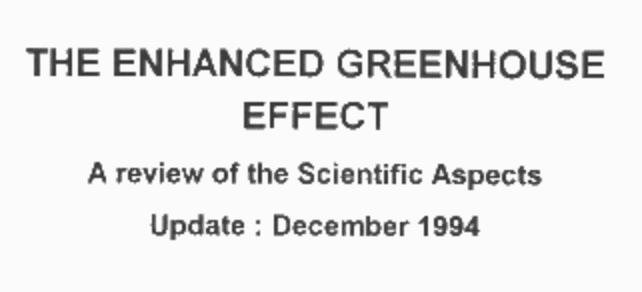In December 1994, Royal Dutch Shell’s (“Shell”) Environmental Advisor, Peter Langcake published a scientific update titled “The Enhanced Greenhouse Effect: A review of the Scientific Aspects.” Unearthed by Jelmer Mommers from journalism platform De Correspondent in a trove of internal Shell documents, this report outlined the company’s “major developments in scientific understanding and the implications for policy formulation.” Recognizing “[t]he threat of climate change [as] the environmental concern with … the greatest significance for the fossil fuel industry,” this report is a rare look at corporate knowledge and planning.
Covering climate modeling, carbon apportionment, and Shell’s scientific “activities,” Langcake first addressed “expressions of scientific opinion” and “agreed scientific fundamentals.” While acknowledging the Intergovernmental Panel on Climate Change (“IPCC”) as “the most coherent, authoritative and influential expression of scientific views on Climate Change,” the report took issue with IPCC’s working groups. “Notwithstanding the controversy,” he continued, there was “complete agreement” on a range of issues, such as:
- increased “radiative forcing” (i.e. higher temperatures) with “important [implications for] living organisms,”
- human activities’ contributions “to the increase in atmospheric greenhouse gas concentrations,” and
- fastest experienced “rate of increase in concentration of atmospheric greenhouse gases … [in] the history of human civilisation.”
A significant remainder of the report was dedicated to outlining skepticism surrounding the IPCC’s methodology, models, and “scientific views.” In so doing, the report emphasized the arguments of “a significant minority outside the IPCC” who believed “concerns over global warming to be exaggerated and misguided.”
The report’s uncertainty surrounding climate science was further reflected in the company’s cautionary approach toward changes in policy. The authors conceded the “consequences of global warming could be dramatic” but took care to note the “major business implications” of climate change, countering that “ill-advised policy measures” would also be “dramatic.” Those impacts led Shell to engage in certain “activities” to ensure that their interests were represented. For example, this report listed Shell’s involvement with the “Peer Reviewers Panel” for IPCC Technical Assessments, MIT Global Change Program, United Nations Framework Convention on Climate Change, and the International Petroleum Industry Environmental Conservation Association. In this report, Shell’s message was clear: although it is “not possible to dismiss the global warming hypothesis as scientifically unsound … any policy measure should take into account explicitly the weaknesses in the scientific case.”
The company’s concern with “policy responses” was also apparent in the graphic “Global warming, the Circle of Uncertainty” (embedded below). The graphic symbolized how man-made climate change could lead to socio-economic consequences. It also highlighted the power of policy responses to shape those consequences. These policy decisions, presumably crafted by the “mainstream” climate science, appeared to concern Shell the most.
Concluding, the report recognized that many of IPCC skeptics “only raise questions or point to uncertainties rather than offer convincing alternative positions.” Despite this observation, Langcake did the same, warning against “‘no regrets’ measures” that would be premature, further distort markets, and divert resources from “more pressing needs.”
Interested in more Shell documents? Full index here.



Pingback: Shell Knew About Climate Risks Since the 1980s, Will it Act Now? - Find Climate Answers